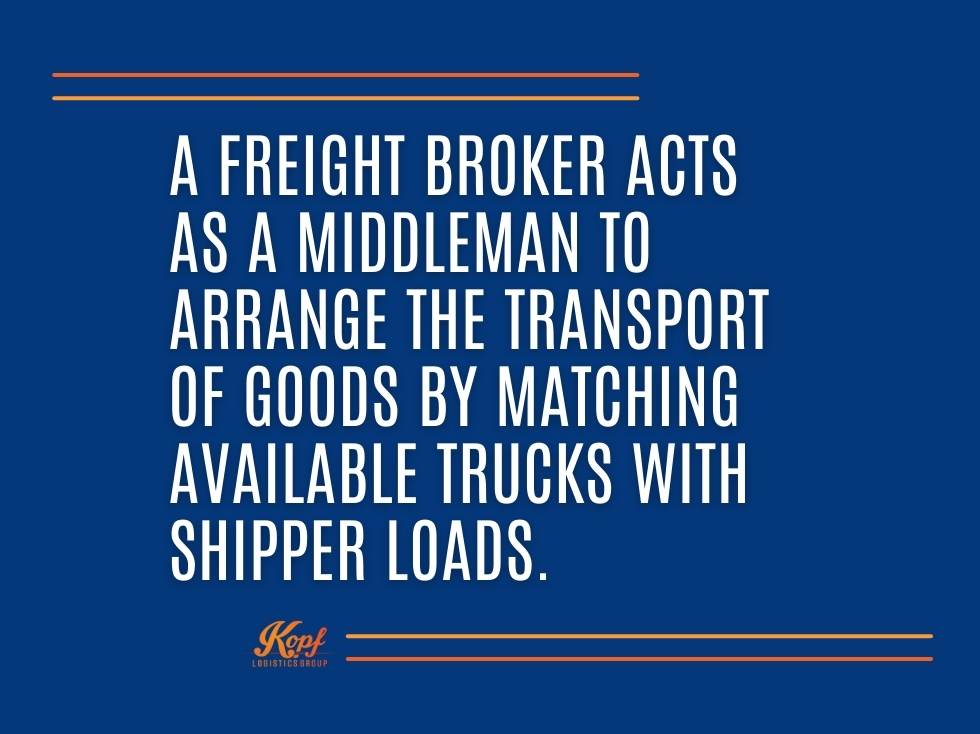In the world of transportation logistics, Freight Brokers play an important role. When a company produces a product they need to ship, the logistics of getting that load successfully from point A to point B involves a few key players in the supply chain, one of which is a Freight Broker. But what exactly is a Freight Broker, what do they do, how do they make money, and are they even worth it? Let’s take a closer look.
The Role of a Freight Broker in the Supply Chain
A Freight Broker acts as a middleman or intermediary to arrange the transport of goods by matching available trucks with shipper loads. This can range from a one-person operation to a larger multinational freight brokerage company with many employees. In order to operate in the United States, Brokers are legally required to be licensed by the Federal Motor Carrier Safety Administration (FMCSA) and secure a surety bond.
Oftentimes the terms Freight Broker and Freight Agent are used interchangeably in the logistics industry, but they are not the same.
Agents work on commission from their home or office under the authority of a licensed Freight Broker to coordinate freight shipments. The Freight Broker, then, is responsible for the financial aspects such as invoicing shippers, paying carriers, extending credit, paying Freight Agents, and assisting with claims.
What Exactly Does a Freight Broker Do?
A Freight Broker’s job is to oversee the financial aspects involved with moving freight. If the brokerage is a larger company, this may be managed by their accounting department. These financial tasks include:
- Invoicing shippers for services rendered
- Ensuring shippers pay invoices promptly and following up as needed
- Paying carriers (trucking companies or truck drivers who actually move the freight)
- Paying Freight Agents working under their authority the commissions they earned
In addition to overseeing the financial aspects of the business, a Freight Broker spends time each day marketing and recruiting new Freight Agents while also supporting their existing ones.
- Onboarding Agents
- Researching, obtaining, and providing Agents with the tools they need to succeed
Kopf Logistics Group, for example, is a trusted freight brokerage offering 24/7 office support and award-winning TMS software to our Agents. We pride ourselves in knowing our Agents by name (learn more about Kopf).

a freight broker acts as a middleman to arrange the transport of goods by matching available trucks with shipper loads
The Duties of a Freight Broker
Along with the financial and recruiting tasks mentioned above, at times a Freight Broker will also perform tasks generally managed by Agents operating under their FMCSA authority. The services provided are as follows:
- Generate new shipper leads. This includes preparing quotes and negotiating prices.
- Secure reliable carriers, this could be from a trucking company or owner operators, to haul loads and develop positive relationships with them.
- Ensure the shipping process is completed successfully by managing, tracking, resolving problems that arise in transit with carriers or truck drivers, and providing shippers with updates.
A Freight Broker will also oversee the operations of their company, including staff development, marketing, customer relations, and standard operating tasks.
How Freight Brokers Make Money
Since Freight Brokers are middlemen between shippers and carriers, they make their money from the margin between what they or their Freight Agent charges a shipper and how much they pay the carrier. Commissions vary from one transaction to the next. Freight Agents earn a commission off each load from the Broker under whose authority they are working. To earn more money, both Brokers and Agents need to move more freight and focus on increasing profit margins.
What is the Most a Freight Broker Can Make?
Just as any business has the potential to make an unlimited profit, the same is true with Brokers. The answer is unlimited. There isn’t a cap on how much a Broker can make. Keeping in mind the terms Freight Broker and Freight Agent are often used interchangeably, the most important factor in determining how much money can be made is the amount of effort you are willing to invest to develop and grow your business. Freight brokering is hard work whether you are a Broker or an Agent. At Kopf, our Agents enjoy a 70/30 commission split with weekly payment.
How Does a Freight Broker Get Loads?
Lead generation is a key part of a successful freight brokerage. In theory, the more freight moved, the greater the profit. This means it is critical to find loads that need shipping. There are many ways to get loads, but it takes a consistent ongoing effort, including:
- Reach out to existing customers
- Encourage referrals
- Cold call (use these tips)
- Cold email (try this template)
- Research shippers at destinations or along routes of current loads
- Research shippers within the same industry of current shipments
This is the same way a Freight Agent secures loads as well.
Are Freight Brokers Worth It?
Yes! Freight Brokers are the right partner for both shippers and carriers. They help many shippers find the best price and often lower rates to keep costs low through their network of motor carriers. Also, they provide expertise and knowledge needed to ensure each shipment arrives safely at its destination. Good Freight Brokers are a resource or value, a needed resource, and one that is growing in demand.
Final Thoughts: Freight Brokerage or Freight Agency
Freight brokerages, like Kopf Logistics Group, are an essential part of the supply chain. Their services help keep freight moving. However, if you are a person who wants the freedom to own your own business in the supply chain without needing the financial backing and authority a Broker is required to have, consider becoming a Freight Agent and owning your own Agency (here’s everything you need to know).

